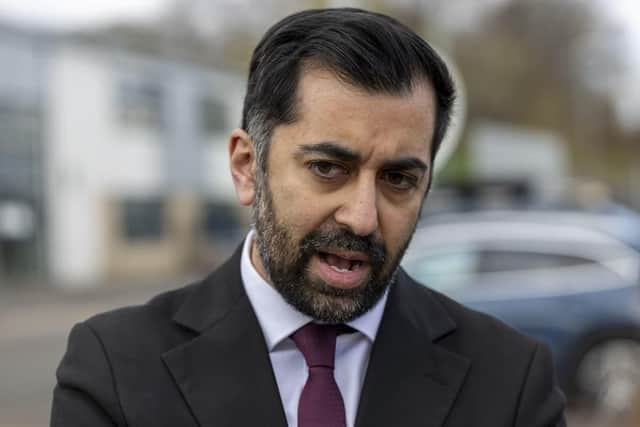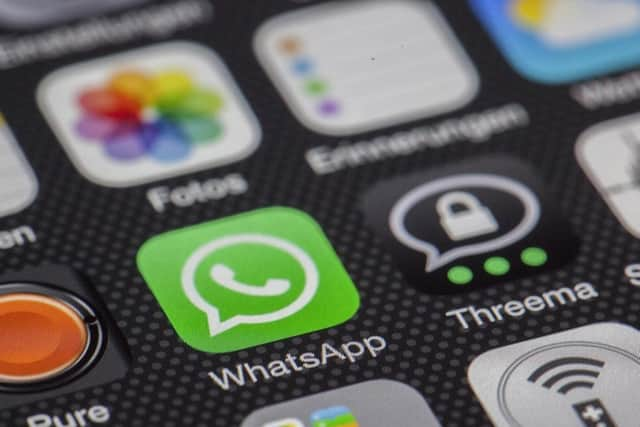Jason Leitch WhatsApp: National clinical director Jason Leitch reported to have deleted Covid WhatsApp messages
National clinical director Jason Leitch's WhatsApp messages cannot be handed to the Covid inquiries as they were deleted every day, it has been reported.
The revelation comes as the Scottish Government was plunged into a centre of a secrecy storm after being criticised for failing to provide the UK Covid Inquiry with messages.
Advertisement
Hide AdAdvertisement
Hide AdFirst Minister Humza Yousaf faced questions in Holyrood yesterday after Jamie Dawson KC, counsel to the inquiry, said no WhatsApp or other “informal” material had been supplied.


Mr Dawson also said it was “surprising” that so few messages appeared to have been retained by figures in the Scottish Government.
The Times has now reported Prof Leitch, a key figure at regular televised Covid briefings, did not have any messages to hand over by the time a "do not destroy" notice was issued by the inquiry. Prof Leitch has not yet commented.
Dame Jackie Baillie, Scottish Labour’s deputy leader, however said the claim “beggars belief”.
Raising the issue of WhatsApp messages at First Minister’s Questions on Thursday, Scottish Conservative leader Douglas Ross said grieving families deserved answers and full transparency.


He said: “Refusing to hand over this information would not only be an insult to grieving families, it would not only be a shocking display of secrecy, it would potentially break the law. So will the First Minister confirm that he will be transparent and release every bit of information this Government holds? And does he accept that if any messages have been deleted, it would be illegal?”
Mr Ross asked: “Why is this information being withheld from grieving families, the inquiry and everyone who deserves answers?”
Mr Yousaf said he had ordered Solicitor General Ruth Charteris to investigate the matter, and he was “seeking assurances” that “do not destroy” notices issued by the inquiry had been “fully complied with, not just by ministers, but by every relevant Scottish Government official”.
Advertisement
Hide AdAdvertisement
Hide AdHe said: “I can only say to the families listening we will take on board those concerns, we will internally investigate fully, because my understanding, certainly as I stand here today, is that relevant information has been passed over. But if there is any concerns raised, they will be fully investigated and I will ask the Solicitor General to investigate them, and, of course, I will update this Parliament on any of those investigations.”


Mr Yousaf, who was previously Scotland’s health secretary, said his own statement to the Covid inquiry was more than 100 pages long.
Speaking to journalists after First Minister’s Questions, he could not say whether ministers used the disappearing message function on WhatsApp, which automatically deletes messages after 24 hours, one week or 90 days, depending on user preference.
In a statement issued later, the Scottish Government said it had been asked by the UK Covid Inquiry to provide “all material related to decision-making”.
It said: “It is not the culture within Scottish Government to use WhatsApp for decision-making – our records management policy states clearly that government decisions should be recorded in the official record. The UK Inquiry has that material from the official record.
“The UK Inquiry has subsequently asked for WhatsApp messages relating to logistics and day-to-day communication, which of course we will provide. However, given the level of personal information contained within, we need a legal basis to do so, for example in the form of a section 21 order.
“The UK Inquiry indicated at this morning's hearing that it will be issuing us with the requisite legal paperwork to allow us to share those messages shortly.
“The First Minister has also asked the Permanent Secretary to ensure that all steps are being taken within the government to meet the Inquiry’s requests and for the Solicitor General to satisfy herself that the government has met all its legal obligations.”
Advertisement
Hide AdAdvertisement
Hide AdIf an individual fails to comply with a section 21 order, they face potential imprisonment or a fine.
Mr Dawson told the UK inquiry that witness statements “suggest that informal communication such as WhatsApp messages were used by key decision makers to discuss matters around the progress of the pandemic in Scotland” and “decisions that the Scottish Government might have to take”.
He said: “A clear theme of the overall response received from and via the Scottish Government is that although such messaging systems were used in the pandemic response, including by some key decision-makers and others, generally very few messages appear to have been retained. This is surprising, in particular in light of the apparent availability of such messages in high volumes within the UK Government.”
Mr Dawson said "one individual who worked for the Scottish Government during the pandemic” had voluntarily provided the inquiry with their WhatsApp messages, but these had been limited to a period covering five-and-a-half months.
Elsewhere, he said the inquiry had also made requests for notebooks and diaries from all Scottish Government witnesses. One was provided, but it later emerged 57 have since been located, with an unknown number of further notebooks held by an additional four individuals.
Representing the Scottish Government, Geoffrey Mitchell KC said the requested messages would be given to the inquiry. He said: “If statements lacked details, then we will ensure that they are as full as they can be. We will provide the messages that have been asked for.”
Mr Mitchell maintained that Scottish ministers using platforms such as WhatsApp was uncommon.
He added: “The Scottish Government has placed itself at the service of the inquiry. It has no reason whatsoever to be unco-operative or slow to respond. I am here today to remind the inquiry of those very facts.”
Advertisement
Hide AdAdvertisement
Hide AdRepresenting the Scottish Covid Bereaved, Claire Mitchell KC told the inquiry: “As I touched on before, we are extremely disappointed by the apparent failure by politicians and civil servants to retain messages and the seemingly widespread use of the auto-delete function. This does not inspire confidence in the Scottish Government’s approach to its full co-operation with this inquiry.
“Saying we are co-operating is one thing – doing it is quite another, and we are pleased at the robust attitude that’s being displayed by counsel to the inquiry in his approach to obtaining all relevant information held in any way.”
Lawyer Aamer Anwar, who also represents the Scottish Covid Bereaved, later said it was “inconceivable” that senior figures in the Scottish Government had failed to retain their WhatsApp messages. He said: “The families we represent deserve the truth.”
He added: “The families we represent welcome the unprecedented and robust response of the UK inquiry on the failure of the Scottish Government to disclose all the material requested. The Government should be answerable to the people, there must be no hiding place for those involved in decision-making.
"I said at the start of this process that no individual, no matter how powerful, can be allowed to interfere with the pursuit of truth, justice, and accountability by this inquiry – those who lost their lives to Covid-19 deserve nothing less.”
The Information Commissioner’s Office confirmed that ministers deleting WhatsApp messages could be deemed a criminal offence if they were trying to prevent that information from being disclosed through a Freedom of Information request.
Comments
Want to join the conversation? Please or to comment on this article.
